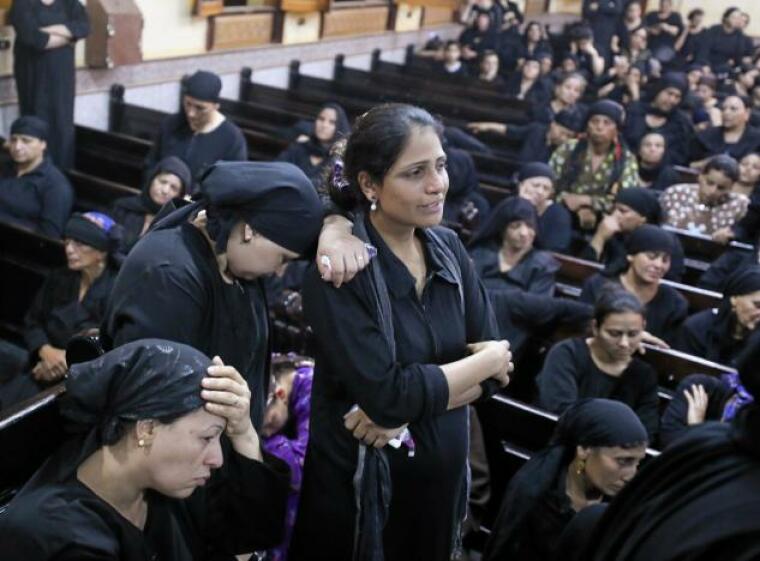Four Coptic Christians in Egypt killed in suspected killing spree by extremists

Egypt's Coptic Christians are fearing that extremists have resumed its jihadist campaign against the Coptic community after four men were killed in the past few weeks.
According to World Watch Monitor, a Coptic Christian was killed in late May, and three more men were found dead in the space of eight days from the last week of June to the first week of July.
No group or individual has claimed responsibility for the killings, but Coptic Christians fear that the victims might have been murdered by extremists who are loyal to groups such as the Islamic State, which vowed to "wipe out" Egypt's Copts in February.
Albert Fekry, a 67-year-old urologist, was found dead with a single gash to his neck in his clinic in Tala, in the northern Monufia Governorate. His priest, Fr. Yousos Joseph, noted that nothing was taken from the clinic and suggested that the killer may have known that the doctor worked alone.
On the same day, Coptic jeweler Girgis Bushra was found dead in his home in Heliopolis outside Cairo. The police stated that the man had been shot, but no arrests have been made as yet.
Michael Nabil Bebawy, a 32-year-old Coptic artist, was found dead in the city of Minya, capital of Minya Governorate, eight days earlier.
According to his brother-in-law, Michael Adel, his body was dumped on railway tracks near the station, and his head was found next to his body.
"A train driver reported seeing three people dumping a body on a section of the tracks. But the police alleged it was a train accident that severed Michael's head from his body," Adel said. "But we found pools of blood some distance away from the tracks, not on the tracks themselves," he added.
The brother-in-law further claimed that the medical examiner who carried out the post-mortem had not visited the site where Bebawy's body was found.
Adel said the police wanted to portray Bebawy's death as a train accident, but he expressed his concern that his brother-in-law might have been killed by extremists, such as those who carried out the massacre of 28 Coptic Christians who were traveling on a bus through the desert in May.
Two days before the bus attack, Coptic building contractor Magdy Zekry Abdel Malak was found dead with a single gash to his neck in his workplace. The contractor's cousin, Malak Rizk, said he believed that he was murdered for his faith, adding that his wallet was found on his body, so he was not killed for money.
The Egyptian government has declared a state of emergency following the attacks on two Coptic Christian churches on Palm Sunday, but it has not prevented subsequent attacks against the Christians, who complain about the state of indifference among the police.
Earlier this month, the Egyptian parliament approved a presidential decision to extend the state of emergency for another three months, starting from July 10.
 Christians don't have to affirm transgenderism, but they can’t express that view at work: tribunal
Christians don't have to affirm transgenderism, but they can’t express that view at work: tribunal Archaeology discovery: Medieval Christian prayer beads found on Holy Island
Archaeology discovery: Medieval Christian prayer beads found on Holy Island Presbyterian Church in America votes to leave National Association of Evangelicals
Presbyterian Church in America votes to leave National Association of Evangelicals Over 50 killed in 'vile and satanic' attack at Nigerian church on Pentecost Sunday
Over 50 killed in 'vile and satanic' attack at Nigerian church on Pentecost Sunday Ukrainian Orthodox Church severs ties with Moscow over Patriarch Kirill's support for Putin's war
Ukrainian Orthodox Church severs ties with Moscow over Patriarch Kirill's support for Putin's war Islamic State kills 20 Nigerian Christians as revenge for US airstrike
Islamic State kills 20 Nigerian Christians as revenge for US airstrike Man who served 33 years in prison for murder leads inmates to Christ
Man who served 33 years in prison for murder leads inmates to Christ


 Nigerian student beaten to death, body burned over ‘blasphemous’ WhatsApp message
Nigerian student beaten to death, body burned over ‘blasphemous’ WhatsApp message 'A new low': World reacts after Hong Kong arrests 90-year-old Cardinal Joseph Zen
'A new low': World reacts after Hong Kong arrests 90-year-old Cardinal Joseph Zen Iran sentences Christian man to 10 years in prison for hosting house church worship gathering
Iran sentences Christian man to 10 years in prison for hosting house church worship gathering French Guyana: Pastor shot dead, church set on fire after meeting delegation of Evangelicals
French Guyana: Pastor shot dead, church set on fire after meeting delegation of Evangelicals ‘Talking Jesus’ report finds only 6% of UK adults identify as practicing Christians
‘Talking Jesus’ report finds only 6% of UK adults identify as practicing Christians Mission Eurasia ministry center blown up in Ukraine, hundreds of Bibles destroyed: 'God will provide'
Mission Eurasia ministry center blown up in Ukraine, hundreds of Bibles destroyed: 'God will provide' Church holds service for first time after ISIS desecrated it 8 years ago
Church holds service for first time after ISIS desecrated it 8 years ago Burger King apologizes for 'offensive campaign' using Jesus' words at the Last Supper
Burger King apologizes for 'offensive campaign' using Jesus' words at the Last Supper Uganda: Muslims abduct teacher, burn him inside mosque for praying in Christ’s name
Uganda: Muslims abduct teacher, burn him inside mosque for praying in Christ’s name